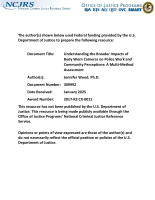Symptoms Consistent With Shift Work Disorder Are Common Across Groups of First Responders
Journal
Sleep
Date Published
2017
Agencies
NIJ-Sponsored
Publication Type
Research (Applied/Empirical)




